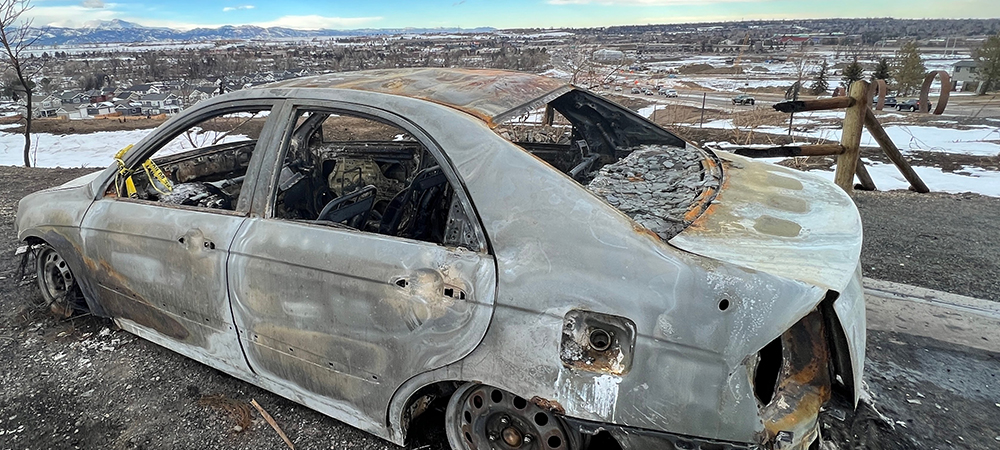 A burned car remains in a Louisville neighborhood impacted by the Marshall Fire. Image credit: Shutterstock/JKO Photos, 2022.
A burned car remains in a Louisville neighborhood impacted by the Marshall Fire. Image credit: Shutterstock/JKO Photos, 2022.
The Natural Hazards Center is pleased to announce five projects funded to study the 2021 Boulder County Fires. These proposals were awarded as part of a special call for Quick Response Research.
A combination of abnormally dry conditions and winds of more than 100 miles per hour helped push several fast-moving fires across sections of Boulder County on December 30, 2021. The largest fire in the county that day—the Marshall Fire—led to the rapid evacuation of tens of thousands of people. More than 1,000 homes were destroyed and 6,000 acres burned.
The five projects funded to collect perishable data about the fires will look at evacuation behavior, the impacts on pets, damages assessments and risk reduction, social capital, and fire impacts on ecosystems.
A full list of project titles and awardees follows. Project abstracts are available on the program’s recently funded awards page.
Drivers of Evacuation: A Multi-Level Study of Social Capital and Mobility During COVID-19
Daniel Aldrich, Northeastern University
Courtney Page-Tan, Embry-Riddle Aeronautical University
Takahiro Yabe, Massachusetts Institute of Technology
Tim Fraser, Northeastern University
This project will attempt to understand why some people evacuated early from risks while others did not leave until their lives were directly threatened. We will use a variety of methods, including extended interviews with survivors, surveys of residents from the area, Facebook for Good data, mobility data, and information on the pre-disaster levels of social capital to study evacuation decisions.
Tracking the Effects of the Marshall Fire on Pets and People
Leslie Irvine, University of Colorado Boulder
Casara Andre, Front Range Veterinary Medical Reserve Corps
This project has three goals. First, it will take a census of lost, found, missing, and deceased pets and assess how these numbers are currently tracked with the goal of improving tracking lost animals in subsequent disasters. Second, this project will assess the impact of the disaster on the veterinary clinics within the burn zone, examining the material, staffing, and other needs following the fire. Third, this project will explore and, if possible, implement ways to meet the needs raised by the veterinarians.
The Boulder Fires: Rapid Integrated Damage Assessment
Karl Kim, University of Hawaiʻi
Lily Bui, University of Hawaiʻi
Eric Yamashita, University of Hawaiʻi
Mike Vorce, Site Tour 360
The project will collect perishable data on damage resulting from the December 2021 Boulder wildfire, using 360-image equipment and processing software to map and characterize the impact of the disaster. The information will be used to support and monitor recovery planning and the development of wildfire risk reduction strategies. The data, imagery, and procedures will be made available through workshops and training sessions to the Boulder community to support collective actions to reduce risks and improve recovery capabilities. The lessons will be incorporated into FEMA-certified recovery training courses offered by the National Disaster Preparedness Training Center.
Monitoring the Recovery of the Coal Creek Ecosystem After the Marshall Fire
Diane McKnight, University of Colorado Boulder
Julie Korak, University of Colorado Boulder
Cresten Mansfeldt, University of Colorado Boulder
Lauren Magliozzi, University of Colorado Boulder
The Marshall Fire burn area overlaps much of the Coal Creek drainage area. Fires at the wildland-urban interface (WUI) pose contamination risk to surface waters, which can have a toxic impact on stream biota such as periphyton and benthic invertebrates. This study will measure standard water quality parameters, the concentration of metals, organic contaminants, and benthic invertebrate/periphyton health during the Spring and Summer of 2022 at eight sites along Coal Creek in Superior, Louisville, and unincorporated Boulder County. Limited data on stream impacts due to WUI fires exists, therefore collecting this time-sensitive data will inform local management decisions and launch future scholarly research activities.
Survey of Evacuation Behavior in the 2021 Boulder County Fires
Xiang Yan, University of Florida
Xilei Zhao, University of Florida
Erica Kuligowski, RMIT University
Ruggiero Lovreglio, Massey University
Thomas Cova, University of Utah
Daniel Nilsson, University of Canterbury
This research will conduct a survey to analyze and understand household evacuation behavior in the 2021 Boulder County Fires. Empirical data collected will be examined alongside findings from the the 2016 Chimney Tops 2 Fire in Gatlinburg, Tennessee, and the 2019 Kincade Fire in Sonoma County, California, to generate new knowledge on risk perception and evacuation decision-making. The comparison of results from a wide range of wildfire contexts will enrich empirical knowledge and test the existing theories.